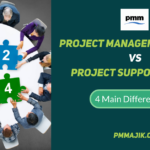Moving the direction of your project management office, or PMO, to be business focussed is an innovative approach to running your projects. Taking the step to reorganise is a challenge and one of the things you need to get right early on is defining the deliverables of a business-focussed PMO.
A traditional PMO focusses on the delivery of projects within parameters such as budget compliance and time management. Although important, a shift towards being business-led means a change in targets.
Here, we’ll discuss:
- Where in an organisation a business-led PMO should sit
- What deliverables you can expect from your new-look PMO
- How the deliverables can be measured
To make sure that when you pivot your PMO towards business focus you can be sure you’re getting the results that you expect.
Who is a business-focussed PMO accountable to?
The remit of a business-focussed project management office, or PMO, is wide ranging. The office’s job is to take an overall view of the projects within a business to ensure they are delivering in line with the strategy, culture, and aims of the business.
Usually, your business-focussed PMO will sit directly under the CEO or CFO. With responsibility to ensure money is well spent and activities align with the business, there needs to be high level accountability.
Because the new PMO will work across departments, it needs to be able to dip into every area and have one, overarching reporting point. Being able to understand the business as a whole is also going to make resource planning and understanding business cases easier.
What does success look like for a business-focussed PMO?
Every area needs to have a way to measure if it’s performing properly. A PMO isn’t above scrutiny and needs to have KPIs like all other departments. The functions of business-focussed PMO mean that goals such as projects being delivered on time aren’t enough.
Financial success
One of the key elements of a business-focussed PMO is to ensure return on investment for each project. In many cases, this will come down to cold hard numbers on the bottom line of the business.
With a remit to select projects as well as ensure successful delivery, it’s possible to measure financial success in a number of ways. Some projects will reduce overheads, others will have a direct impact on productivity. Whichever it is, their expected financial benefit to the business should be outlined and the PMO ultimately accountable.
Business alignment
Every good business should have clear direction and know what it wants to be. There should be an easy to understand:
- Values statement
- Mission statement
- Aims and targets
That every part of the business can get behind and work towards.
The PMO has to ensure that every project aligns with the aims of the business. Measuring each project will be a little different. When a project begins it must be clear how it should deliver for the business and this can be checked upon completion.
Personal development
A business-focussed PMO should be a leader for all of the project managers under it. A good leader should always look for ways to develop, empower, and train their team to perform better.
The amount of training completed, time spent on personal development, and how many people working on projects received recognition are all measurable and should have a direct impact on the success of a project. Overall employee satisfaction can also be measured through turnover and retention rates.
Proactive management
Responding to markets and changing business landscapes is important, and a business-focussed PMO needs to have an eye on this. Projects can quickly become obsolete in a fast-paced market and regulatory changes can mean a project has to reset.
Office activity such as moving project scope, adjusting schedules, and reallocating resources across projects are all clear indicators of being ready to adapt.
Conclusion
Pivoting to a business-focussed PMO will be novel experience for many in the field, even if you’re a project manager with plenty of years under your belt. Having a clear roadmap of what the office needs to do as well as how it will be measured will drive success. The deliverables of a business-focussed PMO are all about improving the business in tangible ways; increasing financial success, ensuring business goals are met, managing and growing talent within projects, and being adaptable are the areas that need to see results.






